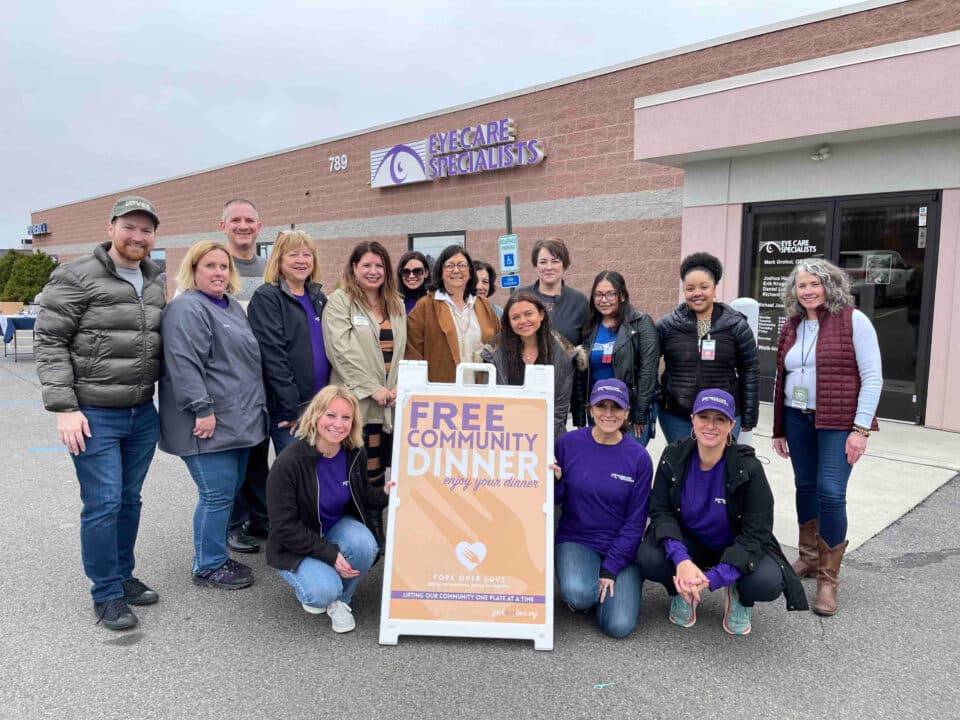Your mom always told you to eat your carrots because they’re good for the eyes. While carrots do contain beta-carotene and that’s true for general eye health, your mom also should have been pestering you to nosh on dark, green leafy veggies and foods rich in omega-3 fatty acids.
Michael J. Ward, M.D., is a board-certified, fellowship-trained retina surgeon at Chester County Eye Care Associates. One of his specialties is age-related macular degeneration (ARMD), the leading cause of blindness in those over 50 [pictured below: visual of what ARMD does to your vision]. He cites the lutein and zeaxanthin found in health powerhouses kale, spinach, collard greens, Swiss chard and other leafy greens as important to macula health. While delicious, carrots alone do not help with ARMD (sorry, mom).
“It’s important to know there are two kinds of ARMD: wet and dry,” Dr. Ward explained. “Wet ARMD is due to abnormal blood vessel growth under the retina, in the macula, which leaks blood or fluid. Dry is a weakening or thinning of the pigment layer under the macula and, over time, causes the retina to deteriorate.”
Sounds like a good reason to eat your veggies. And to see the eye doctor regularly.
Sadly, there are no early symptoms. A good eye care schedule increases the odds your eye doctor will see small deposits under the retina—the first signs identified through a dilated eye exam. By the time you notice symptoms, such as blurring of the central vision (dry), or distorted or wavy vision (wet), the disease has already started to take hold.
“If you have a family history, you should see your eye doctor yearly,” Dr. Ward added. “If not, every two years works until you’re 50; then, you should go yearly.”
About 90 percent of those diagnosed have dry ARMD, and, unfortunately, there is no effective treatment aside from lifestyle modifications such as diet (greens, omega-3), exercise (cardio), quitting smoking, limiting sun exposure and keeping blood pressure in check. The 10 percent with wet ARMD should heed those diet and lifestyle recommendations, but also can opt for medicines injected into the eyeball. Dr. Ward reports this treatment is very successful in stabilizing ARMD, and that a fair amount will regain the vision they’ve lost.
I hope to avoid a shot in the eye by opting for a big plate of kale sautéed in extra virgin olive oil and garlic alongside an omega-3-rich fish: salmon, albacore tuna, mackerel, lake trout or sardines. Good vegan sources of omega-3 are chia seeds and flaxseeds. Not a fish fan? You can also supplement to get these important nutrients. Dr. Ward recommends a daily dose of 6-15 mg of lutein, the same for zeaxanthin and 1-2 g of omega-3.
A large, clinical trial, the Age-Related Disease Study (AREDS), also found taking high doses of vitamins A, C and E, copper and zinc reduced the risk of developing advanced ARMD by about 25 percent. Find out what’s best for you: contact Chester County Eye Care Associates to learn more about prevention and treatments.
And while you’re at it, tell your mom to eat her greens!
Find Chester County Eye Care Associates at located at 915 Old Fern Hill Rd., Building B-Suite 200, in West Chester. For information and appointments, call (610) 696-1230. More information is available here. Follow the associates on Facebook too. Local farmers’ markets are great opportunities to stock up on good-for-your-eyes’ produce, including Artisan Exchange, Kennett Square Farmers Market and West Chester Growers Market.
Michael J. Ward, M.D., is a board-certified, fellowship-trained retina surgeon specializing in the full range of vitreoretinal diseases including macular degeneration, diabetic retinopathy, retinal tears and detachment, ocular trauma and infections, and retina surgery for macular hole and epiretinal membrane. He utilizes state-of-the-art diagnostic equipment such as digital fundus imaging, fluorescein and ICG angiography, fundus autofluorescence, ocular ultrasound, optical coherence tomography, and treatments such as the latest injectable medicines for age-related macular degeneration, and the world’s most advanced automated pattern laser – the PASCAL.



